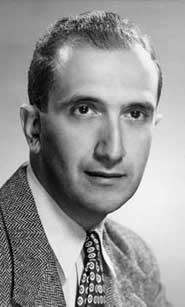| Salvador Luria  AKA Salvador Edward Luria AKA Salvador Edward Luria
Born: 13-Aug-1912
Birthplace: Turin, Italy
Died: 6-Feb-1991
Location of death: Lexington, MA
Cause of death: Heart Failure
Gender: Male
Religion: Jewish
Race or Ethnicity: White
Sexual orientation: Straight
Occupation: Biologist, Activist
Party Affiliation: Democratic Nationality: United States
Executive summary: Natural selection in bacteria Military service: Italian Army (1935-37) American scientist Salvador Luria conducted some of the earliest experiments in the emerging field of molecular biology, including a series of experiments with bacteriophages (viruses that infect bacteria). In 1943, in collaboration with Max Delbrück, he showed that the hereditary material in viruses can undergo permanent changes, and theorized that the spontaneous bacterial mutations led to simultaneous presence of phage-resistant and phage-sensitive bacteria in the same culture. In 1945, working with Alfred D. Hershey, he proved the existence of these and other bacterial mutants. Luria, Delbrück, and Hershey shared the 1969 Nobel Prize for Medicine. His students included DNA decipherer James Watson.
Born in Italy, he fled Mussolini’s fascist policies against Jews, relocating to France in 1938 and coming to America in 1940, where he obtained citizenship in 1947. He regretted not speaking out against Italy's movement toward fascism, and in America he became politically active. He opposed America's involvement in the Korean and Vietnam wars, and was unable to attend several scientific functions in Europe as his visa was canceled. His presidency of his local office of the University Teachers' Union in the late 1940s led to the loss of his employment at Indiana University. He was denied federal funding for his lab on at least three occasions during the Eisenhower and Johnson administrations. Father: Davide Lurie
Mother: Ester Sacerdote
Wife: Zella Hurwitz (Professor of Psychology at Tufts, m. 18-Apr-1945, one son)
Son: Daniel David Luria (economist)
High School: Liceo Ginnasio Massimo d’Azeglio, Turin (1929)
Medical School: MD, University of Turin (1935)
Fellow: Research, Institute of Radium, Paris (1938-40)
Scholar: Surgical Bacteriology, Columbia University (1940-42)
Professor: Bacteriology, Indiana University Bloomington (1943-50)
Professor: Microbiology, University of Chicago (1950-59)
Professor: Microbiology, Massachusetts Institute of Technology (1959-64)
Professor: Sedgwick Professor of Biology, Massachusetts Institute of Technology (1964-70)
Professor: Institute Professor of Biology, Massachusetts Institute of Technology (1970-91)
Jean-Pierre Lepetit Prize 1935
Guggenheim Fellowship 1942
Louisa Gross Horwitz Prize 1969 (with Max Delbrück)
Nobel Prize for Medicine 1969 (with Max Delbrück and Alfred D. Hershey)
National Book Award for The Sciences 1974 for Life: The Unfinished Experiment
American Academy of Arts and Sciences
American Academy of Microbiology
American Association for the Advancement of Science
American Association of University Professors
American Philosophical Society
American Society for Microbiology President, 1967-68
American Society for Biochemistry and Molecular Biology
Genetics Society of America
National Academy of Sciences
Salk Institute for Biological Studies Fellow, 1965-70
Sigma Xi Scientific Research Society
Society for General Microbiology
University Teachers' Union Local President, 1948-50
American Naturalist Editorial Board
Experimental Cell Research Editorial Board
Journal of Bacteriology Editorial Board
Journal of Molecular Biology Editorial Board
Photochemistry and Photobiology Editorial Board
Proceedings of the National Academy of Sciences Editorial Board
Virology Editorial Board
Naturalized US Citizen 1947
Heart Attack 6-Feb-1991 (fatal)
Italian Ancestry
Jewish Ancestry
Author of books:
Life: The Unfinished Experiment (1979, science)
A Slot Machine, a Broken Test Tube: an Autobiography (1984, memoir)
Requires Flash 7+ and Javascript.
Do you know something we don't?
Submit a correction or make a comment about this profile
Copyright ©2019 Soylent Communications
|